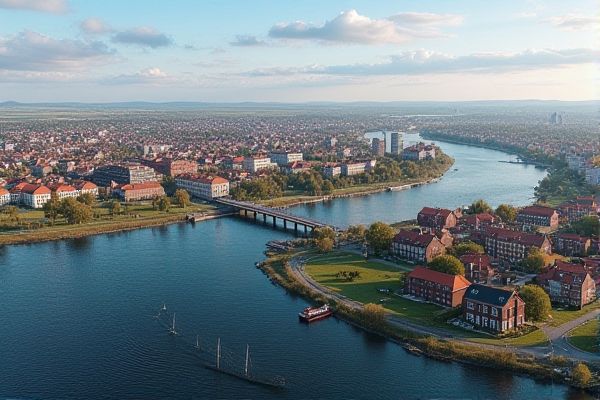
Why moving to Denmark: High quality of life. Excellent healthcare system. Strong social welfare benefits. Renowned education system. Eco-friendly culture. Work-life balance emphasis. Safe and low crime rates. Rich history and culture. Bicycle-friendly infrastructure. Vibrant culinary scene.
High quality of life
Denmark offers a high quality of life due to its strong welfare system, emphasis on work-life balance, low crime rates, and a focus on well-being, making it one of the happiest countries in the world with excellent healthcare, free education, and a stable economy. According to Leap29, these factors contribute significantly to Denmark being an attractive location for individuals seeking a fulfilling lifestyle.
Excellent healthcare system
Moving to Denmark offers access to an excellent healthcare system, characterized by universal, publicly financed care that includes free primary, specialist, hospital, mental health, preventive, and long-term care services. General Practitioners act as gatekeepers, and there is a robust digital health infrastructure to enhance patient care and efficiency. For more information on the intricacies of the Danish healthcare system, visit the International Health Policy Center of The Commonwealth Fund.
Strong social welfare benefits
Moving to Denmark offers strong social welfare benefits, including universal access to free education and healthcare, subsidized childcare, and comprehensive unemployment and disability benefits. These are all financed through progressive taxation, ensuring equal access to fundamental welfare services for all citizens regardless of their financial background. For more details on this, visit the Danish Welfare State page, where you can explore how these measures contribute to the country's renowned quality of life.
Renowned education system
Denmark's education system is highly regarded for its equal and free access to education, high standards, relevance to the labor market, and a strong emphasis on lifelong learning, making it an attractive option for those valuing quality education. The system includes compulsory education from ages 6 to 16, with a focus on integrated primary and lower secondary education, and free higher education for Danish citizens. For more detailed insights into the structure and policies of Denmark's educational framework, visit the National Education Systems website.
Eco-friendly culture
Denmark offers a highly eco-friendly culture, characterized by a holistic approach to sustainability that includes renewable energy, efficient water management, waste recycling, and green transportation, such as a strong bicycling culture. The nation is an ideal place for those who value environmental responsibility. For more information on their initiatives, visit Denmark's Innovation And Design Sustainability page.
Work-life balance emphasis
Denmark excels in work-life balance, with a 37-hour official work week, only 2% of employees working very long hours, and a significant portion of the day dedicated to personal care and leisure. This equates to approximately 68% or 16.3 hours spent on personal well-being and relaxation daily. Such an emphasis on work-life equilibrium makes Denmark an ideal place for balancing career and family life. For more detailed insights, you can visit the OECD Report that highlights Denmark's achievements in this area.
Safe and low crime rates
Denmark is known for its low crime rates, with a significant decrease in property crimes such as burglaries, thefts, and robberies over the past decade. However, there has been an increase in reported violent crimes and sexual offenses, which is largely attributed to increased reporting and new legislation. For more detailed insights and statistics, refer to the comprehensive data on Crime in Denmark available on Statista. This illustrates the complex relationship between law changes, society's evolving norms, and crime reporting trends.
Rich history and culture
Denmark offers a rich history and culture, spanning from the earliest hunters and farmers around 10,000 BC, through the Viking Age, the introduction of Christianity in 965 AD, and the establishment of a unified kingdom, making it a country with a deep and diverse historical heritage. For more information on this fascinating past, visit Denmark's History to explore the full breadth of its remarkable journey through time.
Bicycle-friendly infrastructure
Moving to Denmark offers unparalleled bicycle-friendly infrastructure, with over $458 million invested in new cycling infrastructure and 400 kilometers of clearly separated cycle paths in Copenhagen. Initiatives like Cycle Superhighways prioritize commuter cyclists' needs for safety and convenience. To learn more about the impressive statistics and ongoing projects that make Denmark a haven for cyclists, visit the official website highlighting these developments.
Vibrant culinary scene
Denmark offers a vibrant culinary scene, featuring Michelin-starred restaurants like Noma and Amass, traditional dishes such as Smorrebrod and roast pork, and a variety of local specialties including fresh seafood, smoked fish, and Danish pastries, making it a paradise for food enthusiasts. For more detailed insights into this gastronomic journey, you can explore the Gastro Itinerary that highlights the best dining experiences across the country.
